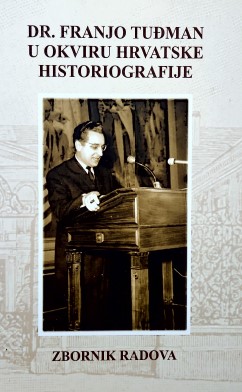«SVJETSKI RAT I HRVATI», DR. FRANJO TUĐMAN O PILAROVU PROMIŠLJANJU HRVATSKE POLITIKE U UVJETIMA PRVOGA SVJETSKOG RATA (1915.)
«THE WORLD WAR AND CROATS», FRANJO TUĐMAN ABOUT PILAR’S VIEWS ON CROATIAN POLITICS IN THE CIRCUMSTANCES OF WORLD WAR I (1915)
Author(s): Zlatko Matijević
Subject(s): Military history, Political history, Croatian Literature, Government/Political systems, Pre-WW I & WW I (1900 -1919), Inter-Ethnic Relations, Geopolitics, Peace and Conflict Studies
Published by: Hrvatski institut za povijest
Keywords: Franjo Tuđman; Ivo Pilar; World War I; Austro-Hungarian Monarchy; Croats; Kingdom of Italy; Kingdom of Serbia; Russia; Great Britain; Germany; France;
Summary/Abstract: Ivo Pilar, Ph. D., (1874-1933), attorney-at-law, completed his brochure The World War and the Croats (Svjetski rat i Hrvati) in March 1915. It was published in Zagreb that same year. Knowing that the authorities of the Austro-Hungarian Monarchy would not be pleased with some of his theses, Pilar published the brochure under the pseudonym Dr. Juričić. The author’s fears of a possible negative reaction to his geopolitical ideas were not ungrounded, since the state’s censor abridged Pilar’s original text thoroughly before he allowed it to be published. The second edition of Pilar’s brochure, containing many sentences that had been censored out of the first edition, most of them pertaining to the Central Forces’ unfaithful ally Italy, was published two years later. In his analysis of the political situation at the beginning of World War I, Pilar concluded that the times were fateful for the Croatian people, since the outcome of the war was going to decide with which country the Croatian territories would side in the long run. Tuđman felt that Pilar’s views were a reflection of the ideas of all the factions in Croatian politics that sought to solve the Croatian national question within the confines of the Austro-Hungarian Monarchy and within the Central European geopolitical territory. Even though Pilar’s basic hypothesis had proved wrong (he assumed Germany and Austro-Hungarian Monarchy would win World War I), some of his ideas, particularly the ideas about the geopolitical position of Croatian territories and their historical fate, still hold their original value.
- Page Range: 103-124
- Page Count: 22
- Publication Year: 2011
- Language: Croatian
- Content File-PDF

